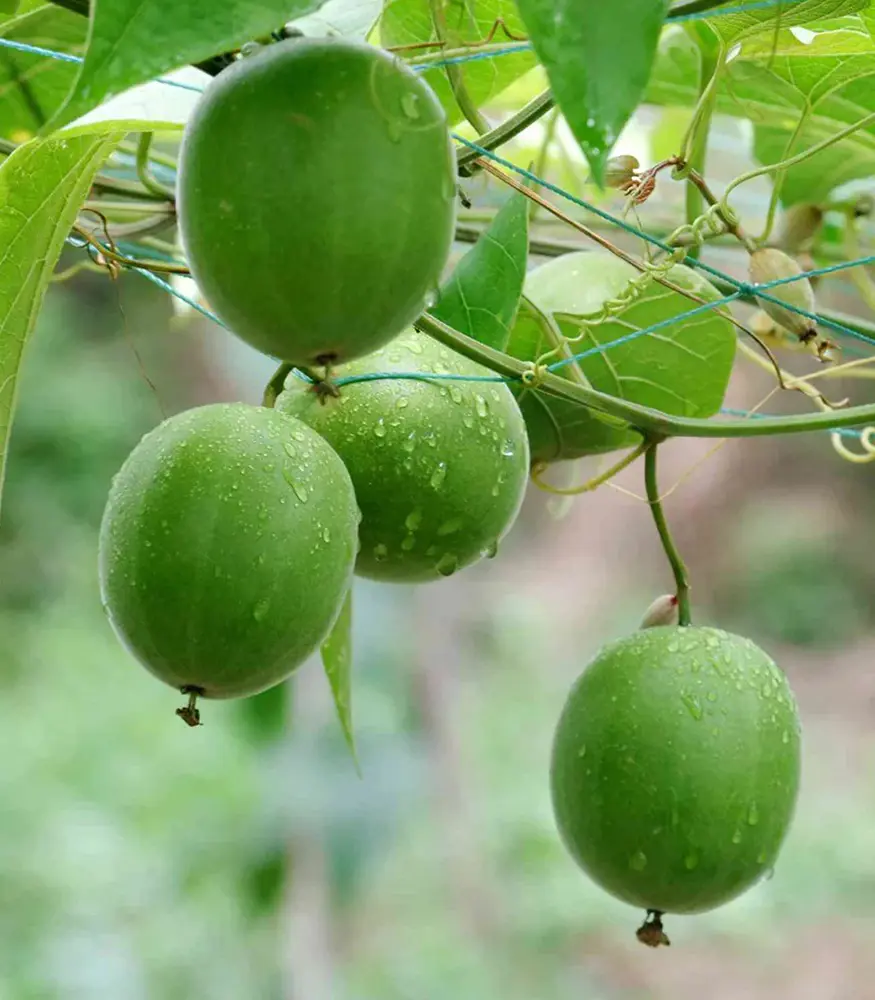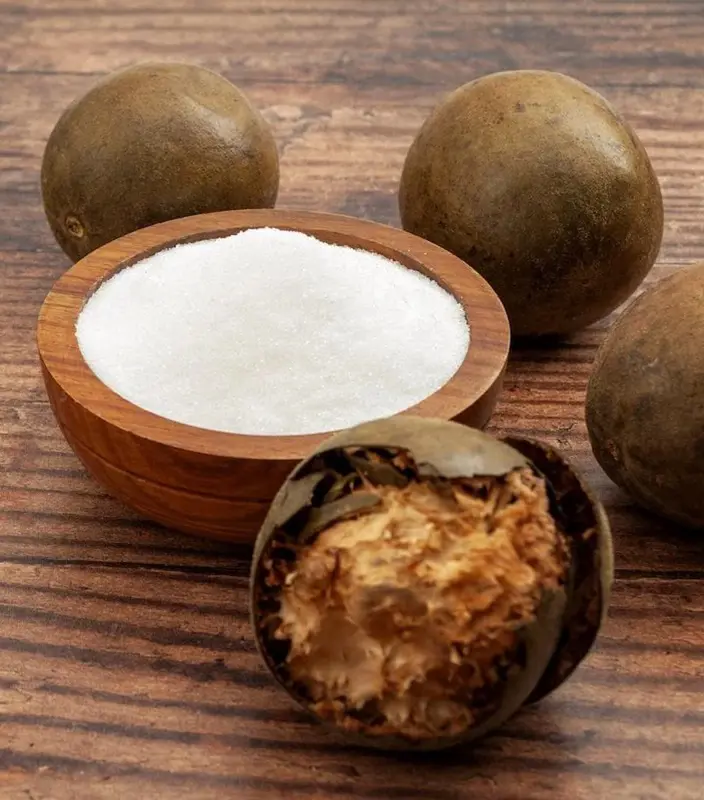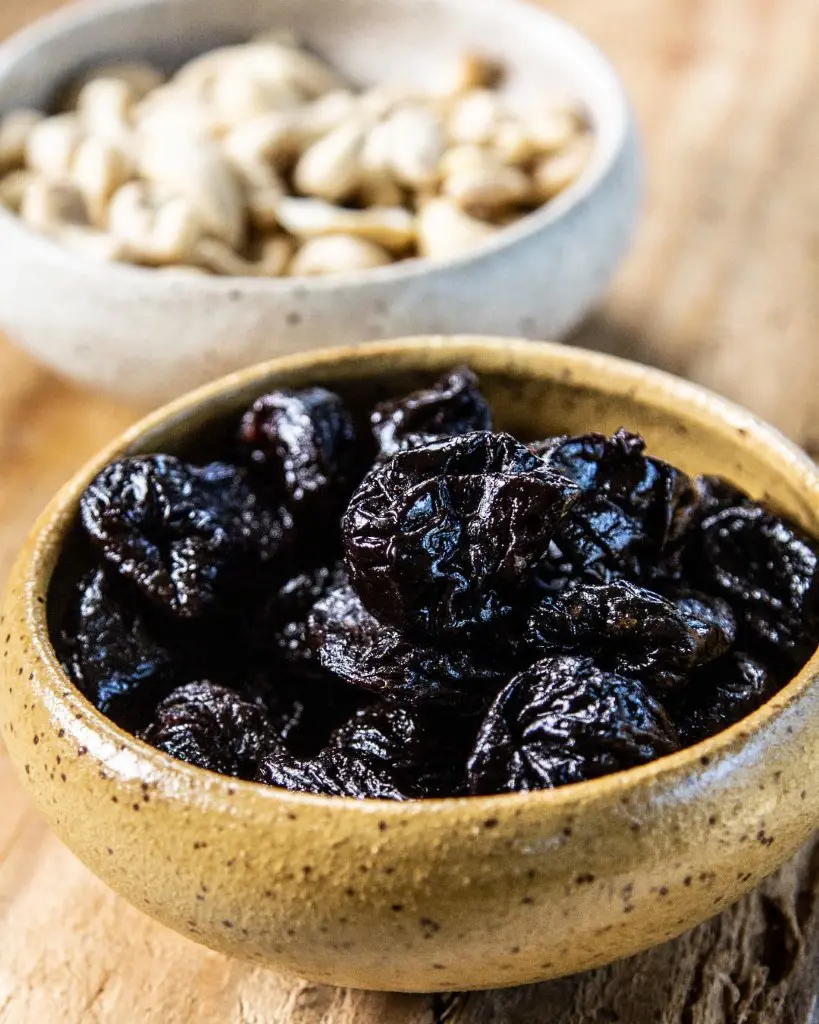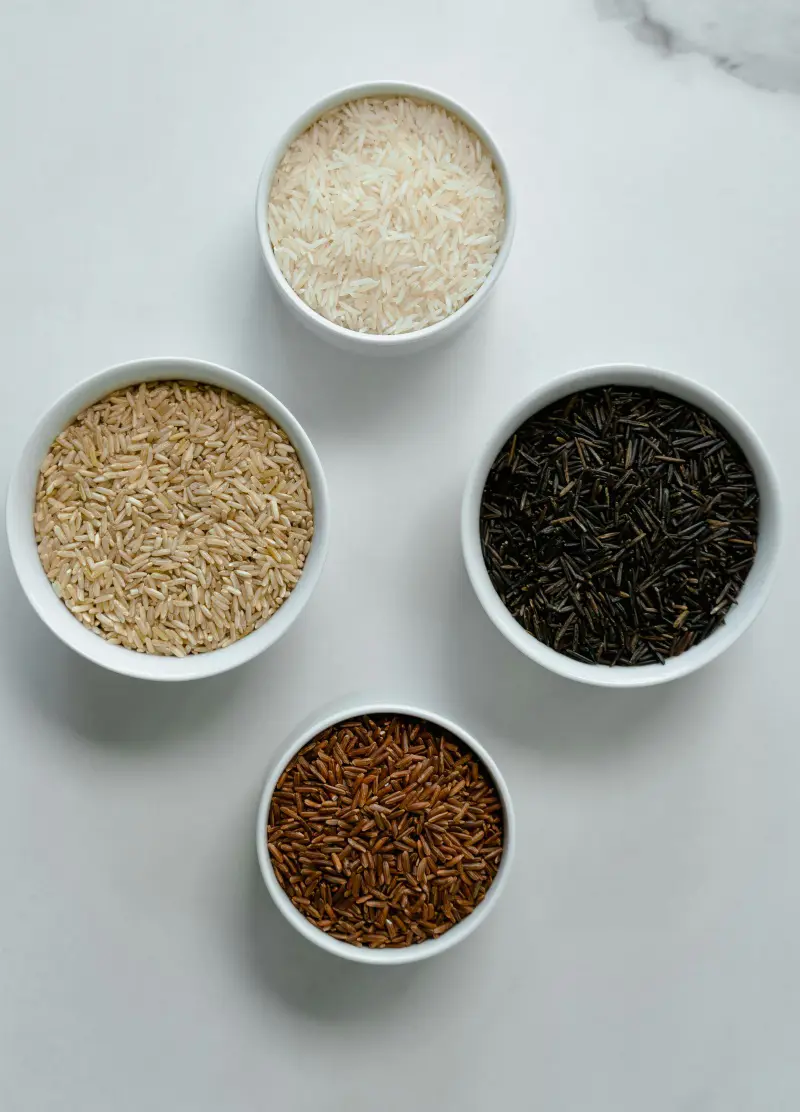Monk Fruit Benefits and Nutritional Value

Monk fruit, a small green melon native to southern China, has gained popularity as a natural sweetener and health booster. Known for its zero-calorie sweetness, monk fruit offers numerous health benefits, making it a preferred choice for those seeking a healthier alternative to sugar.
This article explores the impressive nutritional profile of monk fruit and delves into its various health benefits, from supporting weight management and diabetes control to enhancing heart health and boosting immunity.
Discover why monk fruit is a remarkable addition to a healthy diet.
Health Benefits of Monk Fruit
Monk fruit, known for its exceptional sweetness and lack of calories, offers a variety of health benefits. Here are 15 notable health benefits of monk fruit:
1. Calorie-Free Sweetener
Monk fruit is a natural, calorie-free sweetener derived from the monk fruit plant. This makes it an excellent choice for those looking to reduce calorie intake without sacrificing sweetness. As a zero-calorie option, it supports weight management and helps prevent obesity, providing the sweetness people crave without adding extra calories.
This is particularly beneficial for individuals on calorie-restricted diets or those looking to reduce sugar consumption. Monk fruit's natural sweetness offers a healthier alternative to artificial sweeteners and high-calorie sugars, making it a popular choice in health-conscious diets.
2. Suitable for Diabetics
Monk fruit sweetener is a safe and suitable alternative for people with diabetes because it does not raise blood glucose levels. This allows individuals with diabetes to enjoy sweet flavors without the worry of blood sugar spikes.
Unlike regular sugar, which can cause significant fluctuations in blood glucose, monk fruit provides sweetness without impacting insulin levels. This can help diabetic patients manage their condition more effectively, offering a sweet solution that aligns with their dietary restrictions. It's a beneficial option for those aiming to maintain stable blood sugar levels.
3. Rich in Antioxidants
Monk fruit is rich in mogrosides, which are powerful antioxidants that help combat oxidative stress. These antioxidants work by neutralizing free radicals, reducing the risk of chronic diseases, and promoting overall health.
The presence of mogrosides makes monk fruit beneficial for supporting the body's defense against oxidative damage, which is linked to aging and various health conditions. Regular consumption of antioxidant-rich foods like monk fruit can contribute to a healthier lifestyle by protecting cells from damage and reducing inflammation, thereby supporting long-term wellness.
4. Anti-Inflammatory Properties
Monk fruit exhibits notable anti-inflammatory effects, which can significantly reduce the risk of chronic diseases such as heart disease, arthritis, and certain cancers. Chronic inflammation is a key contributor to many health issues, and reducing it can lead to improved overall health.
The anti-inflammatory properties of monk fruit help in mitigating inflammation in the body, promoting better health outcomes. By incorporating monk fruit into one's diet, individuals can benefit from its ability to reduce inflammation, supporting a healthier and more balanced immune response.
5. Promotes Weight Management

As a calorie-free sweetener, monk fruit can play a crucial role in reducing overall calorie consumption, which supports weight loss or maintenance. Replacing high-calorie sugars with monk fruit allows individuals to enjoy sweet flavors without the added calories, making it easier to adhere to a calorie-controlled diet.
This can be particularly beneficial for those trying to lose weight or prevent weight gain. By integrating monk fruit into their diets, people can satisfy their sweet tooth while adhering to their weight management goals, promoting a healthier lifestyle.
6. Safe for Allergy Sufferers
Monk fruit is generally well-tolerated and less likely to cause allergic reactions compared to other natural sweeteners like honey or stevia. This makes it a suitable option for individuals with allergies or sensitivities to other sweeteners.
Its hypoallergenic nature ensures that even those with food sensitivities can enjoy its sweetness without adverse effects. This makes monk fruit a versatile and accessible sweetening option for a wide range of people, providing a safe alternative for those who may struggle with allergies to more common sweeteners.
7. May Have Anti-Cancer Properties
Preliminary studies suggest that the antioxidants found in monk fruit may possess anti-cancer properties. These antioxidants help prevent the development and progression of cancer by neutralizing free radicals and reducing oxidative stress.
By mitigating oxidative damage, monk fruit can potentially lower the risk of cancer formation and support overall cellular health. While more research is needed to fully understand its anti-cancer effects, the presence of potent antioxidants in monk fruit highlights its potential role in cancer prevention and health promotion.
8. Improves Digestive Health
Monk fruit contains natural compounds that can enhance digestive health. Its anti-inflammatory properties may soothe the digestive tract, promoting a healthier gut environment. This can lead to improved digestion and reduced gastrointestinal discomfort.
By incorporating monk fruit into their diets, individuals can support their digestive system and potentially alleviate issues such as inflammation or irritation in the digestive tract. A healthier gut contributes to better nutrient absorption and overall well-being, making monk fruit a beneficial addition to a digestive-friendly diet.
9. Supports Heart Health
The antioxidants and anti-inflammatory properties of monk fruit contribute to heart health by reducing oxidative stress and inflammation, both of which are risk factors for heart disease. These properties help protect the cardiovascular system from damage and support overall heart function.
By incorporating monk fruit into their diet, individuals can potentially lower their risk of developing heart-related conditions. Its ability to reduce inflammation and oxidative stress highlights monk fruit's role in promoting a healthier heart and supporting long-term cardiovascular health.
10. Enhances Skin Health

The antioxidants in monk fruit are beneficial for skin health by reducing oxidative stress and promoting healthier, more youthful-looking skin. These antioxidants help protect the skin from damage caused by environmental factors, such as UV radiation and pollution.
Regular consumption of monk fruit can support skin elasticity, reduce signs of aging, and improve overall skin appearance. By neutralizing free radicals, monk fruit helps maintain healthy skin cells, contributing to a glowing complexion and providing a natural way to enhance skin health.
11. Anti-Microbial Properties
Monk fruit possesses natural anti-microbial properties that help protect against infections and support a healthy immune system. These properties can be particularly beneficial in reducing the risk of certain bacterial and viral infections.
By incorporating monk fruit into their diet, individuals can enhance their body's ability to fight off pathogens and maintain a robust immune response. This makes monk fruit a valuable addition to a health-conscious diet, offering protection against microbial threats and supporting overall immune health.
12. May Improve Insulin Sensitivity
Some studies suggest that monk fruit may help improve insulin sensitivity, which is beneficial for individuals with insulin resistance or type 2 diabetes. Improved insulin sensitivity can lead to better blood sugar control, making it easier to manage diabetes.
By enhancing the body's response to insulin, monk fruit can help stabilize blood sugar levels and reduce the risk of diabetes-related complications. This potential benefit makes monk fruit a promising option for those looking to improve their metabolic health and manage diabetes more effectively.
13. Lowers Risk of Obesity
By providing a sweet taste without the calories, monk fruit can help reduce overall calorie intake and lower the risk of obesity. This is particularly important in a world where obesity is a growing concern.
Replacing high-calorie sugars with monk fruit allows individuals to enjoy sweet foods and beverages while managing their weight more effectively. This can contribute to a healthier diet and lifestyle, reducing the likelihood of obesity-related health issues. Monk fruit offers a practical solution for those seeking to maintain a healthy weight.
14. Supports Oral Health
Unlike sugar, monk fruit does not contribute to tooth decay and cavities. Its anti-microbial properties can help promote oral health by reducing the growth of harmful bacteria in the mouth. This makes monk fruit a tooth-friendly alternative to traditional sweeteners.
By reducing the risk of dental issues, monk fruit supports overall oral hygiene and health. Incorporating monk fruit into one's diet can help maintain healthy teeth and gums, providing a sweet solution that benefits dental health.
15. Versatile and Easy to Use
Monk fruit sweetener is versatile and easy to use, making it simple to incorporate into a healthy diet. It can be added to beverages, baked goods, sauces, and more, providing a natural and healthy alternative to sugar. Its adaptability makes it a convenient choice for various culinary applications.
Whether used in cooking or baking, monk fruit offers the sweetness needed without the calories or health concerns associated with sugar. This versatility ensures that individuals can enjoy their favorite recipes while maintaining a healthier lifestyle.
Nutritional Facts

Unlike many other fruits, Monk fruit is primarily valued for its sweetening properties. Its sweetness comes from natural compounds called mogrosides, which can be up to 300 times sweeter than sucrose (table sugar) without contributing calories. Here are some key nutritional aspects of monk fruit:
-
Calories and Carbohydrates: Monk fruit is low in calories and carbohydrates. The dried fruit contains about 25% to 38% carbohydrates by weight, but most are non-digestible fibers or mogrosides, which do not raise blood sugar levels.
-
Vitamins and Minerals: Monk fruit contains small amounts of vitamins and minerals, including vitamin C, known for its immune-boosting properties. The exact nutritional content can vary depending on how the fruit is processed and consumed.
-
Antioxidants: Monk fruit is rich in antioxidants, particularly mogrosides, which have anti-inflammatory and antioxidant properties. These compounds help neutralize free radicals, potentially reducing oxidative stress and the risk of chronic diseases.
Things to Consider While Eating Monk Fruit
While monk fruit offers numerous health benefits, there are a few considerations to keep in mind:
1. Purity of Monk Fruit Products
When purchasing monk fruit products, it is important to check the ingredient list. Some monk fruit sweeteners may contain additional ingredients such as sugar alcohols (like erythritol) or other fillers that can affect their nutritional value and health benefits.
2. Moderation
Even though monk fruit is a healthier alternative to sugar, it is still important to consume it in moderation. Excessive consumption of any sweetener, even a natural one, can lead to a preference for overly sweet foods and potentially disrupt healthy eating habits.
3. Allergies and Sensitivities
While rare, some individuals may experience allergic reactions or sensitivities to monk fruit. It is always a good idea to start with a small amount to see how your body reacts.
4. Processing and Additives
Be aware of how monk fruit is processed and if any additives are included. Some commercial monk fruit products may contain preservatives or other chemicals that can reduce their health benefits.
5. Impact on Gut Health
Some individuals may experience digestive discomfort when consuming sugar alcohols, which are sometimes added to monk fruit sweeteners. If you have a sensitive stomach, look for pure monk fruit extract without added sugar or alcohol.
How to Eat Monk Fruit in a Healthy Way
Monk fruit can be consumed in various forms, from fresh fruit to dried fruit and extract. Here are some healthy ways to incorporate monk fruit into your diet:
1. Monk Fruit Sweetener
The most common way to consume monk fruit is in the form of a sweetener. Monk fruit sweetener can be used in place of sugar in beverages, baking, and cooking. Since it is much sweeter than sugar, a small amount goes a long way.
2. Fresh Monk Fruit
Fresh monk fruit can be consumed directly, although it is not commonly available in fresh form outside of Asia. The fresh fruit can be sliced and added to salads or eaten on its own.
3. Dried Monk Fruit
Dried monk fruit is more readily available and can be used to make teas or added to soups for natural sweetness. It can also be ground into a powder and used as a sweetener.
4. Monk Fruit Tea
Monk fruit tea is a popular way to enjoy the benefits of this fruit. Simply steep dried monk fruit in hot water to create a naturally sweet and soothing beverage. This tea can be enjoyed hot or cold.
5. Monk Fruit Extract
Monk fruit extract is highly concentrated and can be used to sweeten a variety of foods and beverages. It can be added to smoothies, yogurt, or oatmeal, or used in baking recipes.







